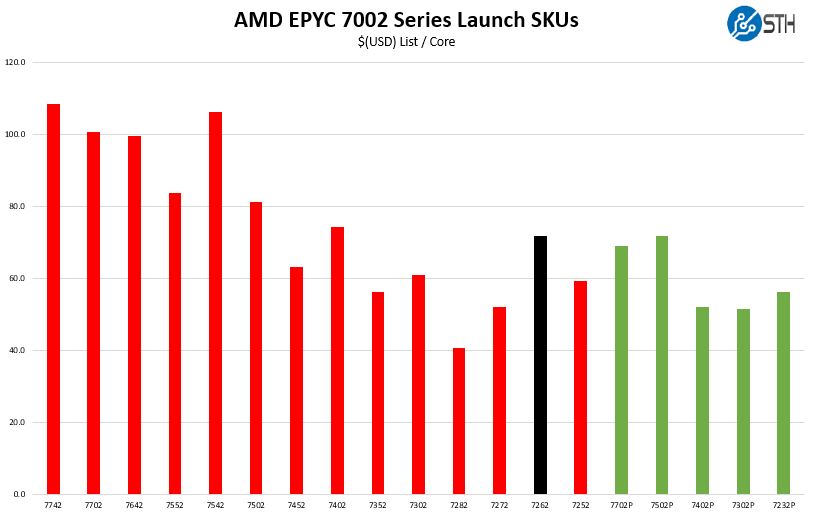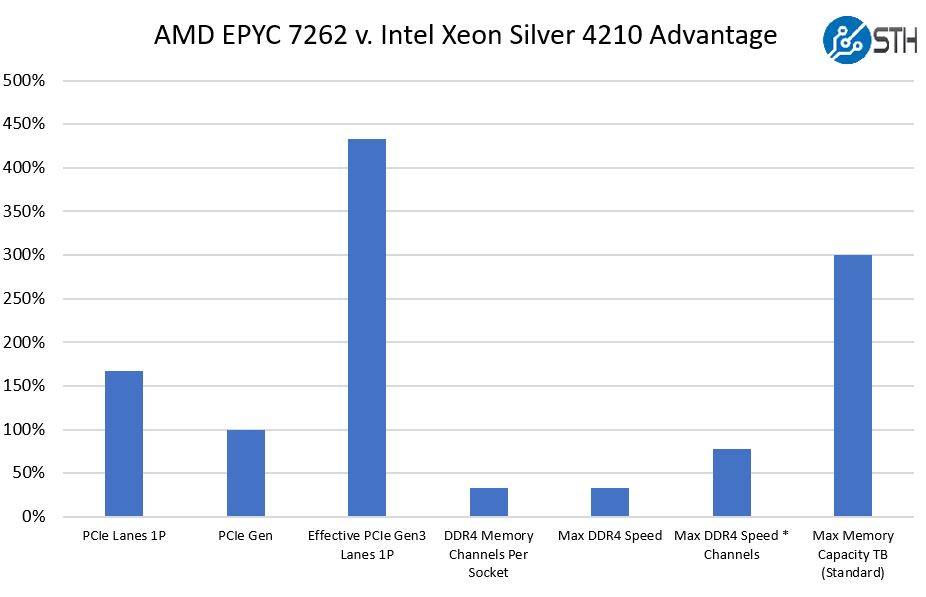AMD EPYC 7262 Market Positioning
Thes chips are not released in a vacuum instead, they have competition on both the Intel and AMD sides. When you purchase a server and select a CPU, it is important to see the value of a platform versus its competitors.
AMD EPYC 7262 v. AMD Alternatives
If you are using a single AMD EPYC CPU in a dual-socket system, with a hope to upgrade in the future, or if you want a low-cost CPU, the AMD EPYC 7262 is priced right. It has great clock speeds and giant caches.
When it comes to single-socket performance, we can see why a company like HPE would use the AMD EPYC 7262 in its single-socket HPE ProLiant DL325 Gen10 base configurations. This is a unique, and very different SKU than anything you can get from HPE’s other servers. Still, an argument can be made for the AMD EPYC 7232P which saves a few dollars and offers close enough performance to be relevant.
For organizations that use dual-socket servers, and need to span from lower-end CPU configurations to higher-end configurations, we think the AMD EPYC 7262 is a great chip.
When we look at the AMD EPYC 7262 versus the rest of the series, as we did in our AMD EPYC 7002 SKU List and Value Analysis article, we see the following:

Although the AMD EPYC 7262 is competitive with the single socket SKUs, it is also more expensive per core than the AMD EPYC 7282 and EPYC 7272. Even on the single socket only “P” side, the EPYC 7302P and EPYC 7402P offer a lower cost per core which means consolidating more onto a single server may make more sense by adding more memory and storage.
AMD EPYC 7262 v. Intel Xeon Alternatives
Against the Intel competition, the AMD EPYC 7262 offers a different value proposition than we see in other CPU segments. Although we saw the EPYC 7262 usually around the performance levels of an Intel Xeon Silver 4214, it is showing a $575 8-core chip with more cache versus a $700 12-core chip. That $125 will not move the needle in most purchasing decisions. At $575 it is closer to, but still about $75 more expensive than an Intel Xeon Silver 4210.
From a price/ performance perspective, the AMD EPYC 7262 certainly is good enough that it wins. This is largely due to AMD’s larger caches and higher clock speeds that allow the chip to have higher performance per core even in this lower-end segment. There is more to the story than the CPU performance. When we look at the platform level, the advantages become stark.

Intel deliberately de-features the Xeon Silver 4200 series. As a result, the Xeon Silver 4200 series can only utilize DDR4-2400 while higher-end SKUs support DR4-2933. AMD EPYC 7002 chips support DDR4-3200. Combined with having fewer DIMM slots per socket, and memory channels, the AMD EPYC 7002 is able to hit higher memory bandwidth figures. With more memory channels the AMD EPYC 7262 has not just more memory capacity than the Xeon Silver parts (4TB v. 1TB) but it also has more accessible memory footprints. For example, one can use 32GB commodity RDIMMs and hit 512GB capacity with EPYC. In contrast, Xeon Silver 4200 can only reach 384GB. Likewise moving up to 64GB DIMM one can hit 1TB on AMD EPYC while only 768GB with Xeon Silver.
At this end of the Intel Xeon stack, Optane DCPMM is not supported which is one of Intel’s major differentiation points. If you want larger or persistent DIMMs, you need to move up Intel’s stack to Xeon Gold. Here, AMD has a unique feature with PCIe Gen4 which you cannot get on the Intel side at the time of this writing.
What Intel has, is lower power consumption for single-socket applications. The 85W CPU TDP plus extra power for Intel’s Lewisburg PCH do not make up for how much power the AMD system can consume. At the same time, if you are using CPUs primarily for memory or I/O connectivity, then you will likely need fewer CPUs on the AMD side which will flip the scales again.
Final Words
The AMD EPYC 7262 simply has high clock speeds and massive caches. This is 16MB of L3 cache per core and 3.2GHz base clock speeds mean that this chip has higher per-core performance than Intel in this segment. Beyond that, the PCIe Gen4 is a differentiator.
Perhaps the biggest question we have after seeing the data, especially on the single socket side where we have seen some vendors specifically utilize the EPYC 7262, is competition within AMD’s line. With a high base clock performance is great, but spending $250 more for an EPYC 7302P will make sense in most cases if one simply wants more capacity.
Overall, we think there is a lot of value for this CPU in the market as it has enough differentiation versus other Intel and AMD offerings.




We were debating those HPE DL325s with these as CDN servers at a few of our international sites. This is a timely review I’ll sent to the team
At least that answers whether we should get the DL325’s with 7262’s or 7302p’s
Thanks for doing these cheaper chips John
Missing is a comparison between the 7262 and its Ryzen counterparts. How does the cache and more RAM channels compare against its consumer counterparts ?
André – the Ryzen is a different class of product to the point that they are not replacements. It is not just cache and RAM channels, but also PCIe.
More importantly, you can get an EPYC server from Dell, HPE, Lenovo, Supermicro but you cannot get a Ryzen server from the big server players.
Unfortunately all tests does not show any advantage of 128MB cache in this cpu. Pity that you don’t have some memory intensive test(s) which would show the advantage of 128MB cache versus 23MB in 7232P. Otherwise 7262 looks as great chip thanks to its huge cache and 3.4GHz max top speed, which is max top speed also of its more expensive siblings.
Just used ‘openssl speed rsa2048’ on my desktop machine (Ryzen 7 3800X) and got:
2090.9 sign/s
72774.1 verify/s
# openssl speed -multi 16 rsa2048
17079.6 sign/s
571428.6 verify/s
Where this cpu is going to shine, is not so much in multithreading, but multitasking. with several very lightly or single threaded apps running at once. Then watch this CPU tear Xeon’s a new hole even more than it already does. And it will pull away much further away from its single socket counterpart.
Hey Pat, just finished reading your article and decided to order an Asrock EPYCD8 MB to pair with the 7262. Do you know if non-ECC memory will work in a server board that requires ECC memory? Figured I’d use what memory I currently have until I could purchase ECC.
Patrick’s GeekBench for this system: https://browser.geekbench.com/v5/cpu/22448
single socket capable?
Single and dual-socket capable, but it does not have the special P series pricing for single sockets
When comparing the 7262 with 7272 and 7282 you forgot about the per socket memory bandwidth (you actually have your own article about it).
Bottom line: the 7262 is the only “entry level” CPU for high throughput streaming content or high performance network file serving (or both). That’s actually quite a unique position coupled with 2xCPU option.
A pitty there is no 7262P…